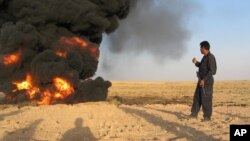After Iraqi sniper Ali al-Tulaibawi returned from his training on the battlefields of Syria his commander sent him on a months-long mission to shoot Islamic State militants from the towers of Iraq's biggest oil refinery.
Tulaibawi says he is one of the 150 Shi'ite militiamen who, along with Iraqi government forces and security officials were trapped in the Baiji complex after militants surrounded it during a sweep through northern Iraq in June.
The mission could either give Iraqi forces critical momentum or a strategic setback in the slow-paced battle against the Sunni militants who use oil and petroleum products to fund what they hope will be a self-sustaining caliphate.
“I was asked by my local commander to prepare myself for a long, sensitive mission,” Tulaibawi, a member of an Iranian-backed militia called Asaib Ahl al-Haq, told Reuters by telephone from the refinery. “I asked him if it's Syria and he said no this time it's Baiji refinery.”
Regional power broker Iran has wide influence over the Baghdad government. It also backs Shi'ite militias who have played an important role halting the dramatic advance by Islamic State fighters through northern Iraq after the army crumbled.
They have received the endorsement of the government even though Sunni Muslims accuse the militias of human rights abuses against their minority sect, charges they deny.
It has taken Iraqi government troops months to reach the city center of Baiji, the town near the refinery.
They have gained about 60 percent of the town center in the past few days, but they will need to cross over a no-man's land believed to contain roadside bombs and Islamic State snipers to regain control of the refinery perimeter, army commanders say.
Air drops, tomato paste
In Syria, where a war also is raging between government troops and the Sunni militants, a tactical unit of Tulaibawi's militia trained him to be a sniper, skills used in alleyways to protect a Shi'ite shrine.
“Death was on every corner,” he said.
In the Iraqi refinery, Tulaibawi and others have lived on airdrops from government helicopters. When they don't arrive they survive for days on tomato paste.
“My comrades called me the hawk in Syria. I was able to shoot the head from difficult positions,” said Tulaibawi.
“Now my job is easier. Every time Daesh attack the refinery I feel I'm playing a video game.”
His scariest moments in the towers are when Islamic State militants are spotted driving Iraqi military trucks packed with explosives towards the refinery defenses.
“We can see the truck coming toward us but it is hard to stop, almost all parts are covered with bullet proof plates,” he said.
A security official in the compound and a YouTube Video corroborate that account. The trucks are reinforced by sand wedged between the plates and metal attached to the vehicles.
The militants have also shot down Iraqi military helicopters defending the refinery, people inside the compound say.
But U.S. air strikes around Baiji have helped Shi'ite militiamen like Tulaibawi hold their ground.
“I'm proud of what I'm doing. I feel with each bullet I shoot at a terrorist's head I'm helping to clear my country from detrimental germs,” he said.
Local militia commanders have urged the fighters to cooperate with government forces. Bonds have formed.
“We became close friends and I was enjoying the stories of fierce battles they had when they were in Syria,” one security official in the refinery said of time spent chatting with Shi'ite militias.











